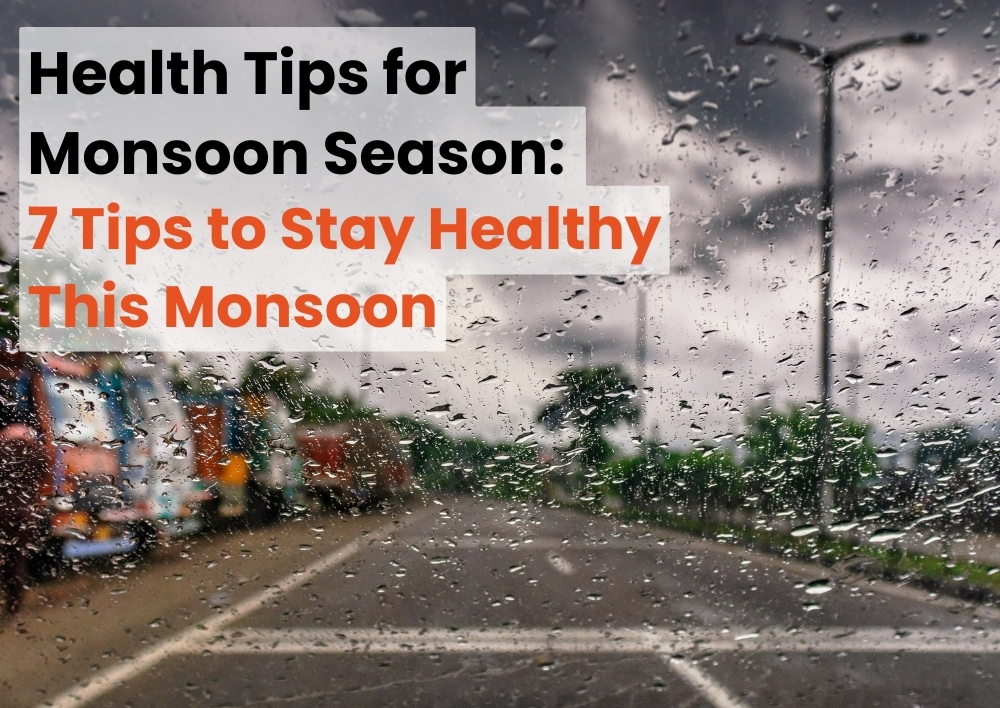Health Tips for Monsoon Season: 7 Tips to Stay Healthy This Monsoon
The monsoon season brings a lot of relief from the humid summer heat, transforming the world into a lush, green paradise. However, along with the beauty and freshness, the rainy season also brings with it a host of health issues. The increased humidity and stagnant water become breeding grounds for various germs and bacteria, leading to an increase in infections and illnesses. To make the most of this delightful season while keeping your health in check, in this blog, the leading the best general physician in gurgaon at Miracles Apollo Cradle/Spectra explains 7 important health tips for the monsoon season to stay healthy during monsoon.
7 Health Tips for Monsoon Season
1. Diet during monsoon
-
Citrus Fruits: Oranges, lemons, and grapefruits are rich in vitamin C, which helps strengthen your immune system.
-
Garlic and Ginger: Both have natural antibacterial properties and can help in warding off colds and flu.
-
Turmeric: Turmeric has both anti-inflammatory and antioxidant properties that help in fast healing.
-
Stay Hydrated: Even though the weather is cooler, it’s still crucial to drink plenty of water. Staying hydrated helps flush out toxins from your body and keeps your immune system functioning optimally. Opt for warm water with a dash of lemon or herbal teas, which can be soothing during the rainy season.
2. Practice Good Hygiene
-
Wash Your Hands Regularly: With the increase in germs during the monsoon, washing your hands frequently with soap and water is essential. This simple practice can prevent a multitude of infections, including the common cold, flu, and gastrointestinal infections.
-
Keep Your Environment Clean: Ensure your living space is clean and dry. Use disinfectants to wipe down surfaces, especially in the kitchen and bathroom. Keep windows closed during heavy rains to prevent water from entering and creating damp spots where mold can grow.
3. Stay Dry and Warm
-
Choose the Right Clothing: Wear light, breathable fabrics that dry quickly to avoid staying in damp clothes, which can lead to skin infections. It’s also a good idea to keep an umbrella or a raincoat handy for unexpected downpours.
-
Dry Your Feet: Monsoon is well-known for causing fungal infections, especially in the feet. Make it a habit to dry your feet thoroughly whenever they get wet. Using an antifungal powder can also help in keeping infections at bay.
4. Eat Wisely
-
Avoid Street Food: Street food might look tempting, but it's better to avoid it during the monsoon. The rain can make it easier for germs to spread, leading to food poisoning. Instead, try making your favorite snacks at home. They are both safer and just as delicious!
-
Eat Warm and Cooked Meals: Eat freshly prepared, hot meals. Soups, stews, and broths are not only comforting but also packed with nutrients that support your health. Include spices like black pepper, cumin, and cinnamon, which help digestion and improve metabolism.
5. Exercise Regularly
-
Indoor Workouts: The rainy weather might limit outdoor activities, but that shouldn’t stop you from staying active. Explore indoor exercises like yoga, Pilates, or home workout routines that can keep you fit and energized.
-
Stay Consistent: Even a short workout every day can boost your mood and immunity. Set a routine that you can stick to, whether it’s a morning stretch session or a dance class in the evening.
6. Protect Yourself from Mosquitoes
-
Use Mosquito Repellents: Mosquito-borne diseases like dengue and malaria are common during the monsoon. Use mosquito repellent creams or sprays to protect yourself, especially in the evenings and at night.
-
Eliminate Breeding Grounds: Ensure there is no stagnant water around your home where mosquitoes can breed. Regularly clean and empty containers, pots, and vases. Using mosquito nets and screens can also provide an added layer of protection.
7. Stay Informed and Prepared
-
Monitor Weather Updates: Stay informed about weather forecasts and advisories. This helps in planning your activities and avoiding unnecessary exposure to heavy rains or floods.
-
Be Prepared for Emergencies: Have a basic emergency kit ready with essentials like a first-aid kit, flashlight, batteries, and non-perishable food items. Being prepared ensures peace of mind during unexpected situations.
Additional Monsoon Healthy Tips
-
Prioritize Mental Health: The dreary weather can sometimes affect your mood and mental health. Engage in activities that you enjoy, such as reading, listening to music, or practicing mindfulness and meditation.
-
Sleep Well: Getting adequate rest is important for maintaining a strong immune system. Aim for 7-8 hours of quality sleep each night. Set a calming bedtime routine and create a comfortable sleep environment to ensure you get the rest you need.
-
Stay Connected: During the monsoon, power outages and connectivity issues can occur. Ensure you have a backup power source for your devices and a list of emergency contacts. Staying connected with friends and family is important for support and assistance if needed.
Consult a Doctor if Needed
If you experience symptoms like constant fever, cough, or any uncommon health issues, consult an internal medicine doctor near you at Miracles Healthcare immediately. Early diagnosis and treatment can prevent complications and promote a speedy recovery.
Conclusion:
The monsoon season is a time of renewal and joy, offering a refreshing change from the heat of summer. By taking proactive steps to protect your health, you can fully enjoy the beauty and benefits of this season. Remember, prevention is always better than cure. Incorporating these monsoon health care tips into your daily routine will not only help you stay healthy during the monsoon but also strengthen your overall well-being. So, gear up, stay alert, and enjoy the rainy days with confidence and joy!





_in_Pregnancy.webp)






Was the information useful?
0 0